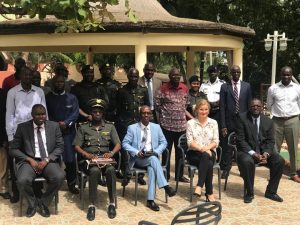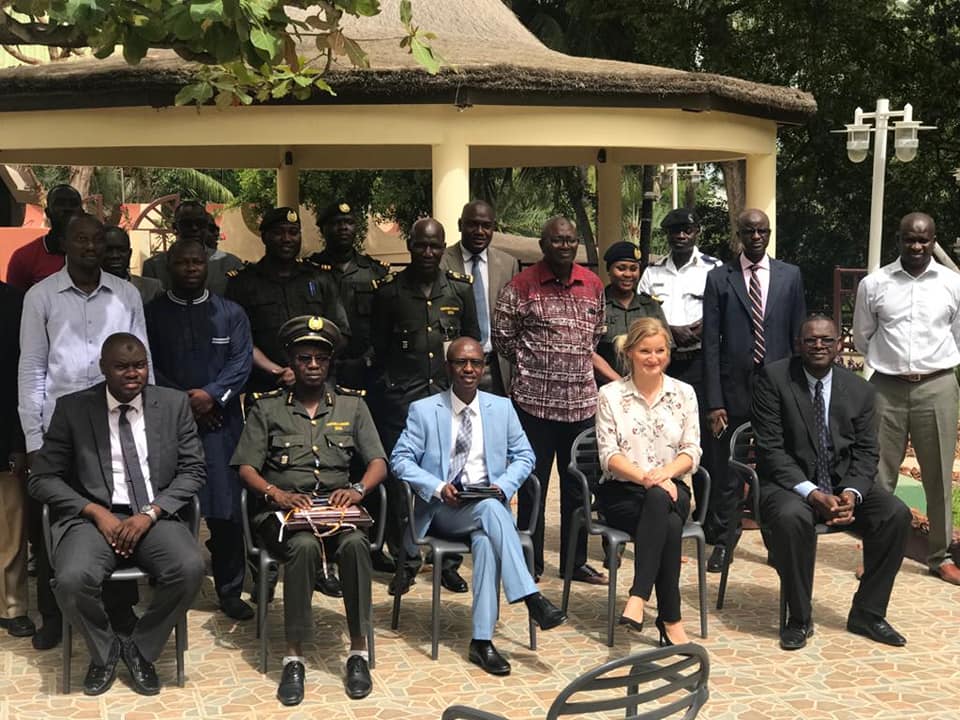 Officials of the Gambia Revenue Authority (GRA) and stakeholders have on Tuesday validated the Time Release Study (TRS) document at the Senegambia Beach Hotel.
Officials of the Gambia Revenue Authority (GRA) and stakeholders have on Tuesday validated the Time Release Study (TRS) document at the Senegambia Beach Hotel.
The TRS is a strategic internationally accepted tool to measure the actual time required for the release and/or clearance of goods from the time of arrival until the physical release of cargo. Potentially, the tool assesses the efficiency and effectiveness of each actor in the flow process of cargo. It identifies bottlenecks with the objective of taking corresponding necessary measures to improve the effectiveness and efficiency of border procedures. The Gambia conducted a TRS to fulfil its WTO obligations using the WCO TRS as a guide.
The Gambia TRS project was conducted from 4th February 2019 to 30th June 2020 by Customs and relevant stakeholders with technical support from WCO and financial support from GIZ. The purpose of the study was to identify bottlenecks and advice policymakers on possible remedial actions. The Study was concentrated at Banjul Wharf (Seaport) situated at the western-most tip of West Africa bordering the Atlantic Ocean with the advantage of navigable waters accessible to vessels from Africa, Europe, America and Asia. Consequently, Banjul Wharf (Seaport) handles a considerable quantity of international trade.
Customs and Excise Department is responsible for border control and the implementation of trade policy measures on international trade. Its mandate is to collect revenue for national development and strikes a balance between control and facilitation. In pursuit of fulfilling this obligation the management deemed it necessary to conduct a TRS. The trade entities are constantly concerned with measures to ensure faster clearance of goods. Hence, Customs through its Top Management sought assistance from WCO to conduct a TRS. Cognizant of the fact that customs alone cannot achieve the desired goal of trade facilitation; key stakeholders were invited to be part of the Study.
The objectives of the TRS are; to establish a baseline measurement of container clearance time, starting from the Berthing of a vessel to exit of containers from seaport; to create the conditions for a more efficient risk-management system and better cooperation between border-control agencies at Banjul Wharf (Seaport) to speed up clearance time; to come up with at least five (5) recommendations for better risk management and more efficient customs clearance formulated; to Ensure That the Gambia complies with Article 7.6 of the WTO TFA through conducting a TRS. The scope of the TRS is to study covered containerized goods of FCL/LCL imports consisting of New Merchandized, Supermarket Items, Second Hand Goods, Reefers, Rice, Cement and foodstuff.
Tuesday’s validation brings to an end the study period covering a period of 16months involving players and stakeholders.
Speaking earlier, Mr. Samson Bilangna and Bernard Zbinden Project Manager and Director respectively both commended GRA and local stakeholders for carrying through this study period.
Mr. Bilanga had this to say “It is good to have all recommendations transformed into an action plan with responsible persons and performance indicators at least”.
Bernard also expressed his satisfaction about the achievements and reiterated the WCO’s willingness to further support relevant reform initiatives, in particular The Gambia’s accession and implementation of the Revised Kyoto Convention (RKC) and connecting the GRA, after migration to AsycudaWorld, o the Systeme Interconnecté pour la Gestion des Marchandises en Transit (SIGMAT) that will enable faster processing and removal of the many transit consignments at Banjul seaport. Other speakers included Ismaila Jallow Project Manager at the GRA, Alieu Bittaye, Project Director at the GRA and Joseph F. Njie, Commissioner of Customs. Mr. Bittaye used the opportunity to thank GIZ for the funding, WCO for the technical support and TRS Technical Working for making the study a success. GIZ was represented by Janine Holscher from the German Embassy in Banjul.
Speaking at the validation workshop the Deputy Commissioner & Head of Domestic Taxes also deputising for the Commissioner General thanked GIZ for funding this activity and the WCO for providing the technical support. He acknowledged the effort of holding this validation using the goggle meet platform with participants stationed across within and outside the country. It could be noted that the WCO made available the services of TRS experts in the persons of Marcellin and David from Cameroon and Mauritius Customs who have been very supportive during the period. In declaring the workshop opened, the DCG&HDT encouraged participants to take the workshop seriously which will encourage investment and enhance trade facilitation Gambia’s competitiveness.
The validation lasted through the day with keen participation form all stakeholders. In closing the meeting the Project Director at the GRA, Mr. Bittaye reminded participant that the Action Plan which is the important tool for monitoring and the implementation of the recommendation. At a later date, a launching will be presided over by the GRA CG to engage policy makers to create a smooth and hitch free clearance and movement of goods out of the Ports of Banjul.
The vote of thanks was delivered by Sulayman Joof President of the Clearing & Forwarding Agents. He used the opportunity to thank the GRA Management for taking up this challenge in carrying out this all important study on TRS. “As a trading country, we rely on imports and the re-export trade for the much needed revenue to finance our development objectives. Trade facilitation engineers economic growth and encourage huge investments and the reduction in cost of freight hence peoples access and affordability in purchasing goods “he concluded.
Prepared by the Corporate & Public Affairs.

